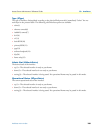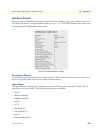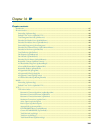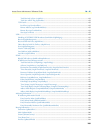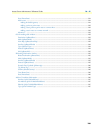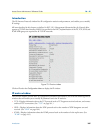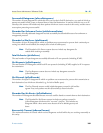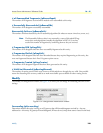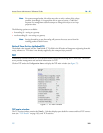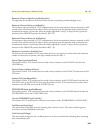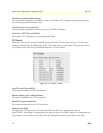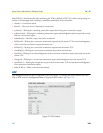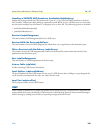
IP main window 188
Access Server Administrators’ Reference Guide 16 • IP
• Modify—This window is where you can modify forwarding and time-to-live settings (see “Modify” on
page 190).
• Addressing Info—This window (see “Addressing Information” on page 198) displays IP addressing details
for the default address for outgoing IP datagrams, the local or loopback address of the box and the IP
address of the box as defined in
20, “System” on page 230.
• Routing Info—This window displays routing information for routing IP datagrams (the IP address, subnet
mask, next hop router, and interface for each network interface defined in the box) (see
“Routing Informa-
tion” on page 199).
• Address Translation Info—The IP address translation table contains the IP address to physical address
equivalences (see
“Address Translation Information” on page 206).
Forwarding (ipForwarding)
The indication of whether this entity is acting as an IP gateway in respect to the forwarding of datagrams
received by, but not addressed to, this entity. IP gateways forward datagrams, IP hosts do not (except those
source-routed via the host).
Note
For some managed nodes, this object may take on only a subset of the values
possible. Accordingly, it is appropriate for an agent to return a “badValue”
response if a management station attempts to change this object to an inap
-
propriate value.
The following conditions can be displayed:
• forwarding(1)—acting as a gateway
• not-forwarding(2)—not acting as a gateway; in this condition, packets will not be forwarded to dial-in users
Default Time-To-Live (ipDefaultTTL)
The default value inserted into the time-to-live field of the IP header of datagrams originated at this entity,
whenever a TTL value is not supplied by the transport layer protocol.
Total Datagrams Received (ipInReceives)
The total number of input datagrams received from interfaces, including those received in error.
Discarded for Header Errors (ipInHdrErrors)
The number of input datagrams discarded due to errors in their IP headers, including bad checksums, version
number mismatch, other format errors, time-to-live exceeded, errors discovered in processing their IP options,
and so on.
Discarded for Address Errors (ipInAddrErrors)
The number of input datagrams discarded because the IP address in their IP header’s destination field was not
a valid address to be received at this entity. This count includes invalid addresses (e.g., 0.0.0.0) and addresses of
unsupported Classes (e.g., Class E). For entities which are not IP Gateways and therefore do not forward data
-
grams, this counter includes datagrams discarded because the destination address was not a local address.



